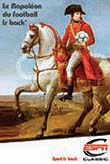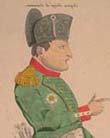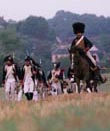| |
| |
 |
 |
EDITORIAL: NAPOLEON ON THE BALL
And they're off! The capital of the ex-kingdom of Bavaria is playing host this evening to the first match of the World Cup. What's that got to do with Napoleon, I hear you ask? Well not much, it's true, but then again, if you think a little harder...
What was Raymond Kopa's nickname? The Napoleon of football. And that Napoleon took Madrid without ever firing a shot.
And what was Jean Tulard's most original talk? "Napoléon and football", which he gave in high spirits to an audience including the veteran French manager Guy Roux, another fan of the history of the Consulate and the Empire.
And what is French national team player, Jean-Alain Boumsong's favourite book this year? Max Gallo's Napoleon, or so he said in the French sports newspaper Equipe on 1 June.
What colour was the uniform of the Grenadiers de la garde? Blue, like the cockerel-adorned strip worn by those playing against the Swiss confederation, next Tuesday.
It's true that all this is stretching things just a little bit too far... but just because you like Napoleonic history doesn't mean that you can't be a football fan.
An excellent, blue-tinged, Napoleonic week to you, and may the best team win!
© ESPN
Thierry Lentz

|
|
|
| |
THIS MONTH'S ARTICLE
"Napoleon; or, the Man of the World" from Representative Men (1850), by Ralph Waldo Emerson
Among the eminent persons of the nineteenth century, Bonaparte is far the best known and the most powerful; and owes his predominance to the fidelity with which he expresses the tone of thought and belief, the aims of the masses of active and cultivated men. It is Swedenborg's theory that every organ is made up of homogeneous particles; or as it is sometimes expressed, every whole is made of similars; that is, the lungs are composed of infinitely small lungs; the liver, of infinitely small livers; the kidney, of little kidneys, etc. Following this analogy, if any man is found to carry with him the power and affections of vast numbers, if Napoleon is France, if Napoleon is Europe, it is because the people whom he sways are little Napoleons...

|
|
|
| |
NAPOLEON ON TELEVISION IN FRANCE, GERMANY AND THE US
On Sunday 11 June 2006 at 8-40 GMT+1 the Franco-German channel Arte is offering its viewers a themed evening dedicated to Napoleon's soldiers. As part of this evening, a documentary by Jean-François Delassus entitled "Austerlitz, la victoire en marchant" will be broadcast. In honour of its themed evening, Arte has put on line a detailed dossier on Napoleon. At the same time, on the other side of the Atlantic, the National Geographic channel will be broadcasting "Napoleon's final battle".
The third compagny of Napoléon
© ARTE F/Olivier Spiro

|
|
|
| |
PARIS CONCERT OF RELIGIOUS MUSIC
For all those who like a good concert, the group who brought you Napoleon's Messe du Sacre, for the bicentenary day in 2004 are striking again. They are to perform a concert of religious music next week (13 and 15 June) in the church of Saint-Pierre in Neuilly at 8-45pm. The programme is to be G.F. Handel's "Israel in Egypt". The two concerts are to accompanied by Jerome's Treille's Orchestre de l'Académie symphonique de Paris and will be in aid of two French charities: L'association de la Luciole, an association supporting families hit by drug addiction and the L'association Le Goéland, national Fragile X syndrome association.
Eglise Saint-Pierre de Neuilly, 90 avenue du Roule – 92200 Neuilly

|
|
|
| |
200 YEARS AGO
11 June, 1806: Creation of the role of Maître des requêtes at the Conseil d'Etat (Council of State) with responsibility for administrative disputes. This new body of civil servants had the power to censure administrators, to suspend their duties and and to pass judgement on them. However, they were not permitted to take direct part in political affairs. In the decree of 11 June, 1806, no limit was placed on the number of maîtres des requêtes possible. Eleven were initially appointed, and by 1815 sixty-four appointments had been made.
For more on the Napoleonic Conseil d'Etat, click here.
150 YEARS AGO
In the late afternoon of 14 June, 1856, the formal religious ceremony of the baptism of the Prince Impérial took place in Notre-Dame de Paris. Born on 16 March, 1856 (see Bulletin n°362), the Prince had suitably august god-parents, namely, Pope Pius IX and Queen Josephine of Sweden, daughter of Eugène de Beauharnais.
The papal anthem "Tu es Petrus", composed by LeSueur for the coronation of Napoleon I in 1804, was performed once again in Notre-Dame.
Wishing you an excellent, Napoleonic, week.
Peter Hicks
Historian and Web editor
THE NAPOLEON.ORG BULLETIN, No 375, 9-15 June, 2006
Interested in the work of the Fondation Napoléon? Why not participate, either generally or in a specific project, by making a donation.
© this Napoleon.org weekly bulletin is published by the Fondation Napoléon. Reproduction or all or part of this bulletin is forbidden, without prior agreement of the Fondation Napoléon.

|
|
|
|
|
|
|
|
|
|
THIS WEEK in the MAGAZINE
Web sites
- Brazilian site on Napoleon
Go to the Napoleonic directory and select 'Enthusiasts' web sites' in the website scroll bar menu
Conferences
Workshop: Luigi Emanuele Corvetto (1756-1821), financier, lawyer and politician, Genoa–Imperia, Italy
Commemorations:
- Plancenoit 2006: 8th Napoleonic Bivouac, Plancenoit, Belgium
- Pultusk 2006, Pultusk, Poland
- Jena 1806-2006 - Rendezvous in Thuringia The "Journées de Thuringe 2006" and the bicentenary of the Battle of Jena/Auerstädt
Exhibitions:
- NAPOLÉON An Intimate Portrait, South Carolina State Museum, Columbia, South Carolina, USA
- Napoleon on the Nile: Soldiers, Artists, and the Rediscovery of Egypt, New York, USA
- Géricault, a world of madness, Lyons, France
- Il tempo dell'Imperatore: gli orologi restaurati delle residenze di Napoleoni all'Elba
- Treasures of the Fondation, Mexico 2006, Monterrey, Mexico
- "Battle in a sittingroom." The Austerlitz wallpaper, Museo Napoleonico, Rome, Italy
- "Beauty celebrating power": Vincenzo Monti in the Napoleonic period, Milan, Italy
Louis Napoleon: at the court of the first King of Holland, 1806-1810, Apeldoorn, Netherlands
Got a problem with the letter? Try the home page: http://www.napoleon.org
<<
|
|





